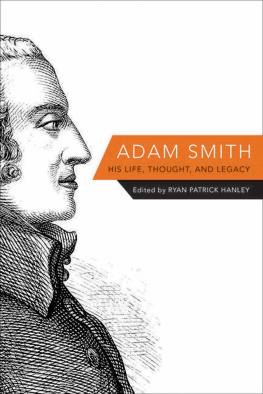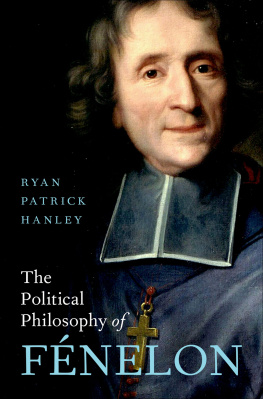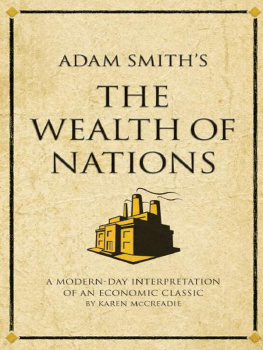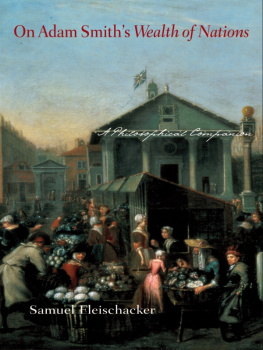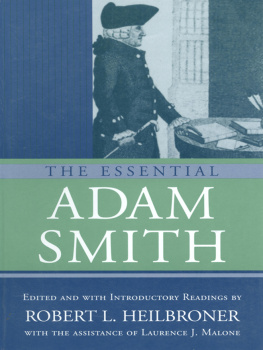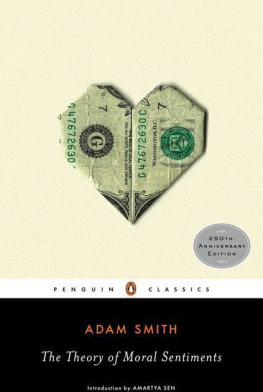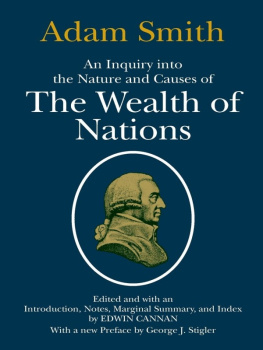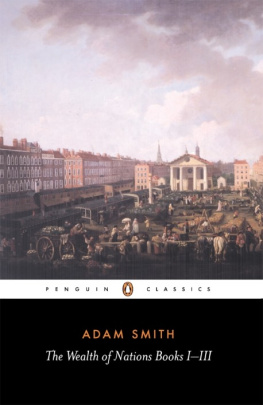
ADAM SMITH
ADAM SMITH
HIS LIFE, THOUGHT, AND LEGACY
Edited by RYAN PATRICK HANLEY
PRINCETON UNIVERSITY PRESS
PRINCETON AND OXFORD
Copyright 2016 by Princeton University Press
Published by Princeton University Press, 41 William Street, Princeton, New Jersey 08540
In the United Kingdom: Princeton University Press, 6 Oxford Street, Woodstock, Oxfordshire OX20 1TW
press.princeton.edu
Jacket art: Adam Smith (17231790), Scottish author and economics pioneer. Private collection/Bridgeman Images.
All Rights Reserved
Library of Congress Cataloging-in-Publication Data
Adam Smith : his life, thought, and legacy / edited by Ryan Patrick Hanley.
pages cm
Includes bibliographical references and index.
ISBN 978-0-691-15405-3 (hardcover : alk. paper)
1. Smith, Adam, 17231790. I. Hanley, Ryan Patrick, 1974, editor.
B1545.Z7A63 2015
330.153092dc23 2015014645
British Library Cataloging-in-Publication Data is available
This book has been composed in Sabon and Helvetica Neue by Integrated Publishing Solutions, Grand Rapids, Michigan.
Printed on acid-free paper.
Printed in the United States of America
10 9 8 7 6 5 4 3 2 1
CONTENTS
|
James Buchan
|
Vivienne Brown
|
Eric Schliesser
|
Knud Haakonssen
|
Jerry Evensky
|
Craig Smith
|
Nicholas Phillipson
|
|
Ryan Patrick Hanley
|
Leonidas Montes
|
Elizabeth Anderson
|
Nicholas Wolterstorff
|
Remy Debes
|
David Schmidtz
|
|
Agnar Sandmo
|
Maria Pia Paganelli
|
Vernon L. Smith
|
Amartya Sen
|
|
Gordon Graham
|
Lisa Hill
|
Lisa Herzog
|
Jacqueline Taylor
|
Chad Flanders
|
Stephen McKenna
|
Karen Valihora
|
Michal Biziou
|
Fredrik Albritton Jonsson
|
|
Gavin Kennedy
|
Samuel Fleischacker
|
James R. Otteson
|
Luo Wei-Dong
|
John C. Bogle
|
Douglas A. Irwin
|
PREFACE
Ryan Patrick Hanley
Right now is the right time to rediscover Adam Smith. For generations Smith was known almost exclusively as capitalisms founding father. But now, around the world, readers are returning to Smith and rediscovering his relevance for our time, within the academy and beyond.
This relevance is in part political. Smith remains famous as one of the first champions of the free market, and his authority continues to be invoked in debates over regulation and deregulation. But now, and indeed more than ever before, the depth of Smiths engagement with several concerns prominent on our own political landscapefrom global justice and poverty, to domestic inequality and freedoms, to the moral benefits and challenges inherent to life in a market societyis not only being appreciated, but indeed being appreciated as a valuable source of wisdom as we attempt to navigate these issues in our own right.
Concurrent with this rediscovery of Smiths practical relevance has been a similar rediscovery of Smith in the academy. A generation of excellent revisionist scholarship has put to rest the caricature of Smith as an apostle of selfishness, and in so doing has also reawakened appreciation of his intellectual contributions to fields beyond economics. Thanks to such scholarship, we now appreciate better than ever the depth of his engagements in and contributions to ethics and jurisprudence and rhetoric and the artsengagements and contributions that are beginning to be explored at ever greater sophistication and depth by scholars in these and other fields.
The present project aims to further such explorations, and in so doing aspires to serve as a guide in the truest sense of the word. In particular, it aims to provide nonspecialist readers with introductions to his key ideas, and to provide advanced readers with suggestions as to how certain of these ideas might productively inform and contribute to current live debates in the contemporary academy as well as the contemporary public sphere. In so doing it aims to supplement without duplicating the excellent work gathered in recent volumes such as The Cambridge Companion to Adam Smith (2006), The Elgar Companion to Adam Smith (2009), and The Oxford Handbook of Adam Smith (2013). These volumes afford invaluable, comprehensive studies of key concepts in Smith, and are to be highly recommended to all students of Smiths thought. But the aim of the essays in this volume is somewhat different. Each contributor was asked to provide a short contributionabout one-third of the length of a standard academic essay. Our hope is that such contributions would not aspire to exhaust Smiths thoughts on a given concept or theme, but instead would open up the core elements of his thought on such issues in a manner that would be useful both to nonspecialist readers perhaps coming to Smith for the first time, as well as to more specialized or advanced scholars interested in the question of how engagement with Smiths thought might help to further debates in their own fields of research.
To these ends, the volume is organized into five sections. The first section offers overviews of the key themes of Smiths works as well as the essential details of his life and context. The second section surveys several of the core concepts out of which Smith constructed his vision of what Jerry Muller has called the decent societyincluding especially his concepts of virtue, equality, justice, sympathy, dignity, and freedom. The third section offers a series of reflections on the several lines of influence that Smiths thought exerted on various approaches to economics. The fourth section offers a series of reflections on the ways in which Smiths ideas have been recently taken up in several contemporary academic disciplines ranging well beyond economicsfrom literature and history and religion to philosophy and law and political scienceand presents a series of suggestions as to how further engagement with Smiths thought might advance specific debates in these fields in productive ways. The volumes fifth and final section explores how Smith speaks to contemporary questions in the public sphere by presenting a series of reflections on the relevance of his insights for some of the most pressing questions of practical life todayfrom growth in the developing world and China, to the transformation of capitalism and the future of free trade, to the seemingly intractable divide between right and left especially evident in recent American politics.
For their efforts in helping to guide us in these inquiries, I am very grateful to our contributorsan outstanding international and interdisciplinary group that includes not only experts on Smith but also experts in fields beyond. I am especially grateful to our contributors for their willingness to take on the challenge of writing pieces that differ somewhat in format from conventional academic essays. I am also deeply indebted to a wonderful team of research assistantsLiliya Yakova, Alan Kellner, Shana Scogin, Brittany Hickman, and Darren Nahwhose collective labors were indispensable to helping to bring this project to press. Finally, I am deeply indebted to the Earhart Foundation for a fellowship instrumental to the completion of my editorial labors on this volume as well as the composition of my own chapter.
Next page
